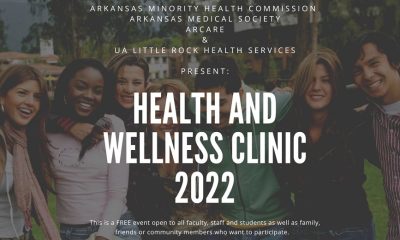Local News
During National Go Red Month, an Arkansas heart survivor campaigns for women’s healthcare
Little Rock, Arkansas – A survivor is sharing her experience in honor of National Go Red for Women Month. She developed cardiac problems during her pregnancy, which she still has now.
In 2012, Merritt Finney was expecting her baby Charlie, but she had an unexpected encounter that nearly ended her life.
“I was working in a busy ER,” said Finney. “It was crazy that month and I had to work about 190 hours on my feet in my eighth month of pregnancy which was insane. I went to my OB and told him I was having shortness of breath and a cough. He told me it was probably bronchitis and I would be okay.”
However, she claimed that when the problems worsened, she was eventually admitted with preeclampsia.
She experienced an increase in blood pressure of 250 over 120 while giving birth to her baby.
“Every day we were in the hospital, I would mention ‘Hey my legs are not going down, I don’t feel right, something is not right’. Every time it was met with, ‘This is normal post-pregnancy stuff, you are going to be okay’.” said Finney.
She continued to have swelling in her legs and shortness of breath after leaving the hospital.
Finney claimed that shortly after her initial hospital visit, she was sent home after learning that she had fluid retention as a result of her pregnancy, but that she had to return a week later.
“I woke up at 3 a.m. coughing up blood and I knew that was a sign I needed to go to the emergency room right then and there,” said Finney. “My blood pressure again was 250 over 120 and my heart rate was in the 140’s. They rushed me back to a cardiac room which I knew in my head was a bad sign.”
Thankfully, she claimed, they identified the true issue.
“My heart had lost over 50% of its ability to pump,” said Finney. “A normal ejection fraction or what their heart pumps out per beat is 55 to 60%. I was at 25%. I was close to needing the ICU and a transplant but they stopped it right there and saved my life and for that, I am very grateful.”
According to Dr. Srikanth Vallurupalli, an associate professor of medicine at UAMS and the VA hospital in Little Rock, women are more likely than males to experience silent heart attack symptoms. If a heart attack becomes more serious, this could result in lost time.
“They may have trouble breathing, excess fatigue, not being able to take a deep enough breath,” said Vallurupalli. “These are not something medical professionals are always in tune to when thinking of a blockage in the heart artery. In the past 20 years, we have had to recalibrate how we think about heart-related symptoms, especially with women.”
Arkansas has the lowest rate of maternal mortality in the nation, according to the Centers for Disease Control and Prevention.
According to Vallurupalli, the pregnancy is to blame for those mild symptoms.
“Having a high degree of suspicion when a woman who is pregnant just does not feel right is the key to finding these problems,” said Vallurupalli.
Vallurupalli advised paying attention to your body regardless of whether you are pregnant and in excellent health or whether you are pregnant and have pre-existing cardiac problems.
He advised seeking immediate assistance if things did not seem right.
“If someone is having significant trouble breathing, walking a few steps, going to the bathroom,” said Vallurupalli. “That is something that should require immediate attention and one should not hesitate to seek help in those situations.”
According to Vallurupalli, bringing about change in this domain will necessitate a team effort, which state officials are presently undertaking.
“Issues such as lack of healthcare, disparities in care, health literacy, and poverty are significant issues,” said Vallurupalli. “For us to make a significant dent in our maternal mortality, we need to work together as a state. Not just women and their doctors but the state and society have to work together to make a dent in some of these problems which are really problems that are not truly health related but have a significant impact on a woman’s health.”
Finney persisted in asking for assistance, and she is thankful to still be alive and to be raising her kid now.
“Left me realizing that Arkansans need education in terms of maternal mortality,” said Finney. “I could have been a statistic and I could have died. Had I not continued to advocate for myself and get help, I could have passed away.”
Finney expressed her gratitude to the medical staff for their assistance and for continuing to keep an eye on her heart’s function.
She had to have a pacemaker implanted in 2019 due to her ongoing cardiac issues, and she will keep pushing for the state to educate women about maternal mortality prevention and promote women’s heart health.
According to Vallurupalli, to identify any potential risk factors and to spot major concerns early, it is always preferable to consult with your doctor, particularly if you are thinking about getting pregnant.
In May, the Benton Event Center will play host to the American Heart Association’s Go Red for Women Luncheon.
-

 Covid-191 year ago
Covid-191 year agoIngesting an excessive amount of vitamin D may result in serious health consequences
-

 Arkansas1 year ago
Arkansas1 year agoHuman remains discovered near a popular Arkansas hiking trail believed to be person missing since 2021
-

 Arkansas1 year ago
Arkansas1 year agoDriver in fatal single-vehicle accident in White County identified by authorities
-

 Local News1 year ago
Local News1 year agoA Sylvan Hills High School student’s painting receives considerable acclaim
-

 Arkansas3 years ago
Arkansas3 years agoArkansas Trying to Close Out Regular Season With Series Win Over Florida
-

 Arkansas3 years ago
Arkansas3 years agoMickelson changes his mind, accepts exemption to US Open
-

 Arkansas2 years ago
Arkansas2 years agoDue to the COVID Pandemic, Arkansas’ math and reading test scores have decreased
-

 Covid-191 year ago
Covid-191 year agoHealth and Wellness Clinic will be held on November 3 at UA Little Rock





Leave a Reply